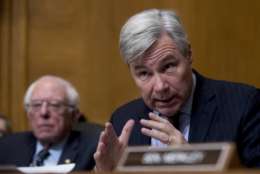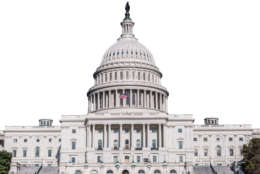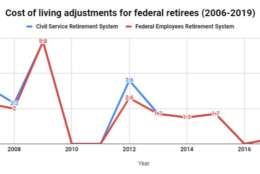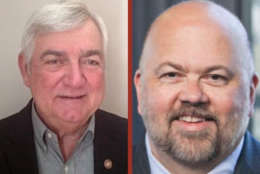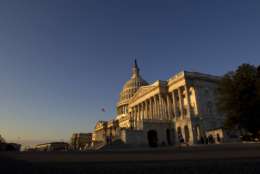cost of living adjustment
-
Many retirees will be watching the inflation index from now through September to see what their January cost of living adjustments will look like.
July 18, 2019 -
Many federal and postal workers live and work in high tax states, so many retire to low-or no-tax states to get more from their annuities.
July 11, 2019 -
Active and retired feds probably won’t know the size of their 2020 pay raise — if any — or cost-of-living adjustment — if any — until late in the year.
July 01, 2019 -
In today's Federal Newscast, legislation in both the House and Senate aims to guarantee every senior a Social Security cost of living adjustment with an annual floor of no less than 3%.
June 25, 2019 -
It will be late this year, probably November or December, before active and retired federal workers find out how much extra money they may have next year.
June 05, 2019 -
If you feel totally confused on the subject of a 2020 federal pay raise, or inflation catch up for retirees, it doesn’t mean you haven’t been paying attention.
May 31, 2019 -
For the last six years many federal workers and retirees have had nightmares about losing major parts of their Civil Service Retirement System and Federal Employees Retirement System benefits. And they’ve gone through a series…
April 17, 2019 -
Federal retirees and folks who get Social Security benefits may be among the few people in the country who get anxious when crude oil prices drop.
April 04, 2019 -
Benefits expert Tammy Flanagan, will be Mike Causey's guest today on Your Turn, airing 10 a.m. EDT, streaming on www.federalnewsnetwork.com or on 1500 AM in the Washington, D.C., area.
April 03, 2019 -
Some politicians have been after the Federal Employees Retirement System since it replaced the more generous Civil Service Retirement System program during the Reagan administration.
March 27, 2019 -
Years after the buyout surge of the 1990s some still-working feds are hanging on until the next round of buyouts. But that could take a while.
March 22, 2019 -
Several members of Congress have declared the President's proposed cuts to federal employee retirement "dead on arrival," while at least one Republican has expressed more of an interest in developing a new system for prospective employees.
March 14, 2019 -
Most of the House Republicans who repeatedly tried to cut costs in the massive FERS program are either gone from Congress or relegated by the 2016 midterm elections to minority status.
March 11, 2019 -
In today's Federal Newscast, lawmakers want to hear from the Indian Health Service's acting director about what he's done to improve on an apparent failure of the agency to provide quality health care.
March 08, 2019 -
For federal workers the good news is that Congress approved a 1.9 percent raise for them despite the fact that the president wanted to freeze pay in 2019.
February 28, 2019




